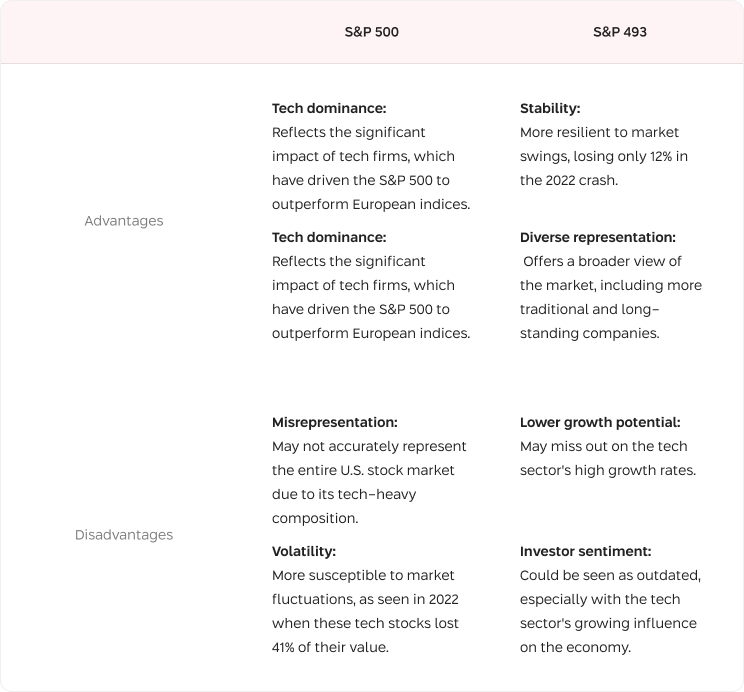In the dynamic world of investing, the recent analysis by The Economist comparing the tech-heavy S&P 500 with a hypothetical, more traditional S&P 493 raises an intriguing question: Does the standard stock market index truly capture the full breadth of the American economy?
This discussion is more than academic; it's a critical consideration for investors seeking to understand the real pulse of the market. That’s where FINQ comes into play as an innovative resource providing a fresh perspective.
FINQ investment offers data-driven insights that go beyond the traditional boundaries of market indices. By utilizing advanced analytics and AI, FINQ provides a deeper, more nuanced understanding of market trends than the indices discussed by The Economist. Our article aims to directly respond to The Economist and explain why.
The S&P 493 vs S&P 500 debate explained
The debate between the S&P 500 and the hypothetical S&P 493 is a fascinating one, shedding light on the nuances of market representation and investment strategies. It’s a discussion centering around the impact of the 'Magnificent Seven' tech giants on the S&P 500 and how excluding them to form the S&P 493 could offer a different market perspective.
The concept of the S&P 500 and rationale behind the S&P 493
The S&P 500 is a renowned stock market index comprising 500 of the largest U.S. companies. However, roughly 29% of its market value is through seven tech firms: Alphabet, Amazon, Apple, Meta, Microsoft, Nvidia, and Tesla. In other words, these companies, all established within the last 50 years, with most surpassing the $1 trillion market cap mark, heavily and disproportionately influence the index.
In contrast, the proposed S&P 493 excludes these tech giants, aiming to provide a more traditional market view. It represents the other 98.6% of companies, focusing on long-established firms like Berkshire Hathaway and Eli Lilly, known for their stability and less rapid innovation.
Advantages and disadvantages of each approach
Each approach has advantages and disadvantages. Let’s take a quick look at them: FINQ's innovative approach to investing
FINQ's innovative approach to investing
Guided by CEO Eldad Tamir, FINQ is transforming investing by fusing big data and AI and stepping beyond the confines of traditional market indices. This innovative approach simplifies the complex world of financial data, providing investors with clear, actionable insights. It's a testament to how intelligently analyzing vast amounts of data can give investors a powerful edge in making timely and informed decisions.
FINQ’s portfolios and how they differ from traditional index-based approaches
FINQ redefines stock market investing with its STOCKS-AI-powered portfolios, providing clarity in the often chaotic market environment. The best part? They markedly stand out compared to the traditional indices with consistent outperformance. The portfolios are:
- FINQFIRST: Moving away from conventional stock-picking strategies, FINQFIRST curates a dynamic list of the top 10 stocks to buy, updated daily. This approach, grounded in sophisticated data analysis and AI, consistently outperforms traditional indices like the S&P 500, offering a fresh perspective on high-potential investments. As of November 30, 2023, FINQFIRST has outperformed the S&P 500 with a year-to-date return of 36.17%, compared to the S&P's 9.31%.
- FINQLAST: FINQLAST challenges the norms of short-selling by providing a meticulously curated list of the bottom ten stocks. This strategy, driven by data intelligence, systematically surpasses traditional methods and the S&P 500 Short Index, offering a more calculated approach to betting against the market. As of November 30, 2023, FINQLAST has outperformed the S&P 500 Short Index, achieving a year-to-date return of 20.22% against the S&P's -9.31%.
- FINQEDGE: Diverging from single-strategy investment methods, FINQEDGE combines the dual tactics of acquiring stocks with high growth potential and short-selling underperformers. This innovative approach yields significant gains over standard benchmarks like the S&P 500, showcasing the strength of a multifaceted investment strategy. As of November 30, 2023, the comprehensive FINQEDGE portfolio has also outperformed the S&P year-to-date with a notable 35.24% to 9.31% margin.
FINQ's data-driven analysis: Benefits and a more comprehensive market view
FINQ's core technology harnesses a robust trifecta: comprehensive data collection, intelligent analysis, and AI evolution. It structures data into three key categories: public sentiment, professional market insights, and detailed company fundamentals. By digitizing and analyzing this data, FINQ strips away noise, focusing on information with theoretical and scientific validity. Its AI system assigns continuous rankings to financial products, offering clear comparative insights.
 FINQ's innovative approach to investing
FINQ's innovative approach to investing